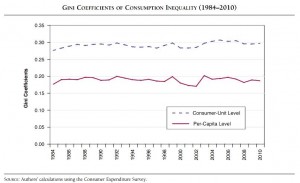Consumption: There is No Increase in Inequality
[T]he Consumer Expenditure (CEX) Survey, shows aggregated changes in consumption expenditures for households at all levels of the income distribution. Using these data, we find that consumption inequality has increased only marginally since the 1980s. Further, consumption inequality narrows in periods of recessions, such as during the 2007-2009 recession. We also construct Gini coefficients from the CEX data and find that they have remained relatively stable over time, suggesting that the inequality has not widened significantly.
Source: AEI Economic Studies.



It’s interesting that, while they are at different levels, the spending between the two groups seems relatively locked to one another.
Why do hard-care conservatives work so hard to tell us that the “world is fair?”
Don Levit
I’m not an economist, so could somebody explain where the extra money is going?
If income inequality is rising, but the rich aren’t consuming more, what are they doing with their extra share of the income?
I, too, will never be mistaken for an economist, but for me this also indicates that “consumer spending” is relatively constant in the grand scheme of things and “stimulus” to increase consumer spending is not the answer to our problems.
It is capital spending on production that will get us moving again and that will not happen with the regime uncertainty under which business now finds itself. The same thing occurred in the 30’s under FDR and we never recovered from that depression until after WWII. No, WWII did NOT get us out of the depression. Not unless you call wage and price controls, rationing and umpteen numbers killed or injured in war a recovery.
“If income inequality is rising, but the rich aren’t consuming more, what are they doing with their extra share of the income?”
If Mitt Romney is any guide, they’re probably hiding it away in tax shelters.
Globalization and free trade lowered the cost of consumption for all households.
@Don, beats me. But it must be that the hard-liners of the right mistake us for neanderthals–even the simplest person can see that the world is nowhere near “fair.”
@Dr. Steve, virtually all of our economic advances since then have involved some sort of “umpteen numbers killed or injured,” only they weren’t Americans, but other nations conquered by American military working for American business.
Indeed, @Eric, the “regime uncertainty” that Dr. Steve is worried about isn’t a problem these days. Thanks to the taxpayer-funded invention of the internet, capital flow is about as lubricated as it can be. If any regime adopts uncertain or undesirable policies, capital can be gone in about a week. Adam Smith’s “invisible hand” that would encourage businesses to invest domestically, thus developing their economies, has lost all its fingers. Why are we surprised that our country isn’t developing?
@Buster, get out of fantasy land. It’s increased domestic profits while raising natural unemployment levels–net gain is zilch.